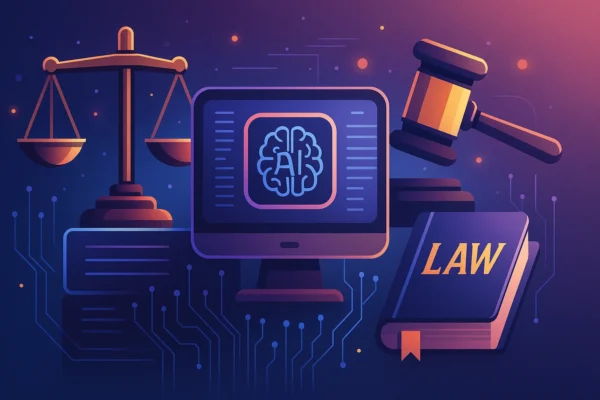
Discover how AI transforms law in 2025 with automation and regulation. Explore legal AI trends, applications, and future impacts.
The legal industry which historically seems to adopt futuristic technologies a little slower as compared to other sectors, is undergoing a seismic shift. Artificial Intelligence (AI) is driving this transformation, reshaping how legal professionals operate. From automating routine tasks to enhancing decision-making, AI is poised to redefine the legal landscape over the next decade. As of April 2025, the global legal AI market is valued at approximately USD 1.9 billion and is projected to grow at a compound annual growth rate (CAGR) of 13.1% through 2034, reflecting a surge in demand for efficiency and accuracy (NatLawReview).
Current Landscape of Legal AI:
The AI adoption in law is accelerating, fueled by investments in legal tech startups and evolving state-level regulations. At least 33 states in the United States formed AI task forces in 2024, with many passing laws targeting AI-generated deepfakes, particularly in elections. The Colorado AI Act, effective February 2026, may see amendments, while Texas’ Responsible AI Governance Act, introduced in January 2025, faces opposition. Law firms are integrating AI to stay competitive, with 50% prioritizing AI exploration, viewing it as a strategic asset.
Examples of Adoption
A&O Shearman: Partnered with startup Harvey to develop AI tools for drafting information requests and identifying merger filings across jurisdictions.
Luminance: Its AI platform automates due diligence, identifying anomalies in legal documents, saving lawyers approximately 4 hours weekly.
Key Applications:
AI’s applications in law are diverse, offering significant efficiency gains:
Application | Description | Example |
|---|---|---|
Document Review | Analyzes vast document sets, flagging relevant information and issues. | Luminance saves 4 hours weekly by automating due diligence. |
Legal Research | Retrieves case laws and statutes faster than traditional methods. | Lex Machina predicts judicial behavior for strategic planning. |
Contract Analysis | Identifies key clauses, obligations, and risks in contracts. | Large Language Models (LLMs) like ChatGPT draft and summarize contracts. |
Predictive Analytics | Forecasts case outcomes using historical data. | Blue J Legal predicts tax case outcomes with high accuracy. |
Document Review and Analysis: AI tools save lawyers time, generating $100,000 in new billable hours annually by automating repetitive tasks.
Legal Research: Predictive justice tools like Lex Machina analyze historical data to forecast trial outcomes, enabling data-driven strategies.
Contract Analysis: LLMs, fine-tuned on internal data, streamline contract drafting and review, reducing review time by up to 50%.
Predictive Analytics: Tools like Blue J Legal help lawyers advise clients by predicting case outcomes with high accuracy.
Technical Aspects of Legal AI:
Legal AI leverages advanced technologies:
- Natural Language Processing (NLP): Enables AI to interpret legal texts that are crucial for contract analysis and research.
- Machine Learning (ML): Learns from data to predict outcomes or identify patterns, such as judicial behavior.
- Retrieval-Augmented Generation (RAG): Combines retrieval and generative models to fetch documents and generate accurate responses that enhances legal drafting.
Recent Developments:
As of April, 2025, key developments highlight AI’s growing role:
AI in Legal Education: The State Bar of California used AI to develop questions for the February 2025 bar exam, sparking debates about AI’s role in assessments.
AI in Legislative Drafting: The United Arab Emirates employs AI to draft legislation, aiming to speed up the process by 70%.
Law Firm Adoption: Firms like A&O Shearman leverage AI for complex tasks, while startups like Harvey provide tailored solutions.
Regulatory Efforts: States lead AI regulation, focusing on deepfakes and consumer protection. No federal AI legislation is expected in 2025, but investment in AI research is rising (TechTarget).
Ethical Concerns: 43% of legal professionals worry about AI output quality, and 37% about data protection. 96% oppose AI representing clients in court (NatLawReview).
Advantages:
AI offers transformative advantages:
- Efficiency: Saves 4 hours weekly per lawyer, allowing focus on strategic work.
- Accuracy: Reduces errors in research and analysis, ensuring reliable outputs.
- Cost-Effectiveness: Cuts contract review time by 50%, lowering costs for firms and clients.
- Accessibility: Cloud-based portals provide affordable legal advice, democratizing access (Forbes).
Challenges and Ethical Considerations:
Legal AI faces significant hurdles:
- Data Privacy: Firms must comply with GDPR and CCPA, ensuring client data isn’t used to train AI without consent.
- Bias and Fairness: AI can perpetuate biases, as seen in COMPAS’ criticized risk assessments. Regular audits are essential.
- Dependence on AI: Over-reliance risks errors, like a 2023 incident where ChatGPT generated fictitious case citations.
- Ethical Use: California’s 2025 State Bar guidelines warn against outsourcing judgment to AI, with 43% of professionals concerned about output quality.
Future Outlook (2025–2035):
The next decade will likely see:
- Increased Adoption: AI may replace entry-level roles by 2030, with LLMs handling drafting and client interactions.
- Regulatory Frameworks: States will lead with laws on deepfakes, while global collaboration addresses cross-border issues.
- Enhanced Capabilities: Quantum computing, like Google’s Willow chip, could enable sophisticated legal tools.
- New Roles and Skills: AI will create roles like AI specialists (39%) and cybersecurity experts (35%), with adaptability (71%) in demand.
Key Trends and Predictions:
| Trend | Description | Example |
|---|---|---|
| Automation | Automates routine tasks, saving time and costs. | Luminance automates due diligence, saving 4 hours weekly. |
| Predictive Justice | Forecasts case outcomes using historical data. | Lex Machina predicts judicial behavior for strategic planning. |
| Democratization | Makes legal services accessible via cloud-based portals. | Self-service platforms offer affordable document generation. |
| Regulation | States lead with AI laws, focusing on deepfakes. | Colorado AI Act, effective 2026, may be amended. |
| New Roles | Creates roles like AI specialists and trainers. | 85% of professionals expect new skills like adaptability. |
AI is revolutionizing the legal industry, enhancing efficiency, accuracy, and accessibility. Its current impact is evident in law firms, education, and legislation, but challenges like bias, privacy, and ethical use require vigilance.





